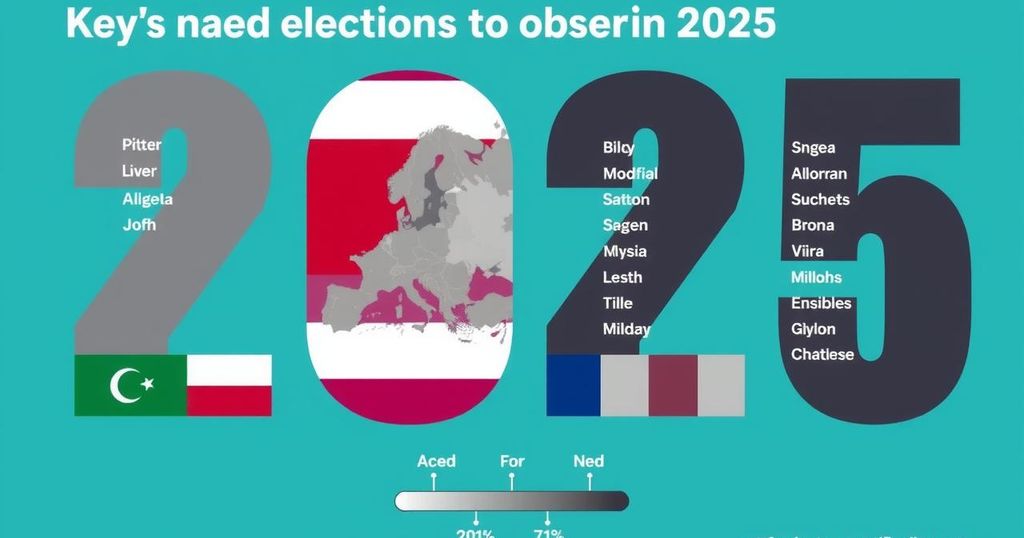Five Key Elections to Monitor in 2025

As 2025 approaches, key elections in Belarus, Germany, the Philippines, Canada, and Chile promise to significantly influence their political climates. Alexander Lukashenko is expected to maintain control in Belarus, while Germany faces a snap election due to coalition collapse. The Philippines’ midterm elections will reflect President Marcos Jr.’s political grip, and Canada may see a shift in leadership under mounting pressure. Chile’s election will determine the future course amidst complex political dynamics.
As we look toward 2025, the electoral landscape appears significantly impactful, albeit less prolific than the preceding year. Notably, five nations—Belarus, Germany, the Philippines, Canada, and Chile—are set to conduct pivotal elections, each grappling with common issues such as inflation, the strengthening of populist sentiments, and the repercussions from ongoing international conflicts. Experts have offered insights into the stakes involved in each of these elections, shedding light on the broader political ramifications.
In Belarus, Alexander Lukashenko, who has ruled since 1994, is anticipated to secure re-election on January 26, 2025. The environment surrounding the elections lacks true opposition, as the prevailing political conditions are marred by repression and exclusion, particularly following the protests and subsequent crackdowns in 2020. The continuation of Lukashenko’s rule aligns Belarus closely with Russian military interests, further complicating the European political climate.
Germany’s unexpected snap election, set for February 23, arises from a government collapse stemming from budgetary disputes that led to Chancellor Olaf Scholz’s coalition losing its parliamentary majority. Scholz faces stiff competition amid economic strife and public dissatisfaction, with a resurgence of the center-right Christian Democratic Union looming large on the horizon, reflecting the tumultuous geopolitical landscape and domestic fiscal challenges.
The Philippines will hold midterm elections on May 12, 2025, which serve as a referendum on President Ferdinand Marcos Jr.’s leadership. Given the recent political discord involving Vice President Sara Duterte, the elections will be critical for determining the future of leadership dynamics and potential impeachment proceedings against Duterte, amidst a backdrop of political control exerted by the president.
In Canada, Prime Minister Justin Trudeau’s tenuous coalition government is precariously positioned, with a potential election hastened by recent political upheavals including the resignation of his finance minister. The evolving political sentiments, juxtaposed with economic challenges and external pressures, may see Conservative leader Pierre Poilievre capitalizing on resentment toward high inflation and Trudeau’s progressive policies.
Chile will conduct its presidential election on November 16, 2025, amidst the complexity of a runoff system that complicates governance. As President Gabriel Boric concludes his term, political stability has been elusive, following public discontent stemming from constitutional reform failures. The opposing coalition, Chile Vamos, is expected to gain traction, raising questions about the viability of leftist agendas in Chile’s future.
These elections in 2025 are pivotal, not only for the nations involved but also for understanding global political trends and their impact on democratic processes.
The electoral calendar for 2025 is shaping to be momentous, featuring key elections across various countries that are influenced by common global themes such as inflation, rising populism, and geopolitical tensions. Particularly, the elections in Belarus, Germany, the Philippines, Canada, and Chile will reveal the dynamics of political leadership and public sentiment in the wake of recent historical events. Each election presents unique stakes and challenges, reflecting the complexities of governance and public desire in different contexts.
In summary, the elections taking place across Belarus, Germany, the Philippines, Canada, and Chile in 2025 hold significant implications for each country’s future governance and political stability. From authoritarian rule in Belarus to snap elections in Germany and potential regime shifts in the Philippines and Chile, these electoral contests will undoubtedly resonate on broader geopolitical and socio-economic fronts. The outcomes will shape not only national policies but also influence global political landscapes moving forward.
Original Source: theconversation.com







